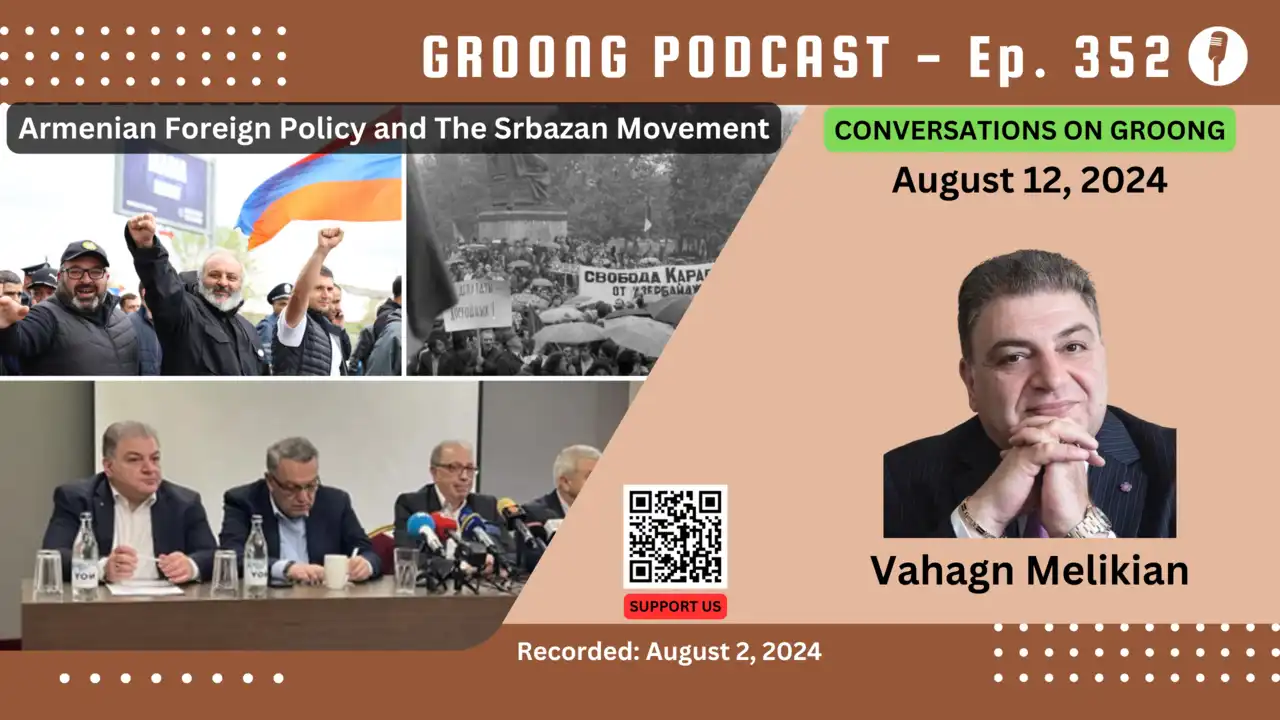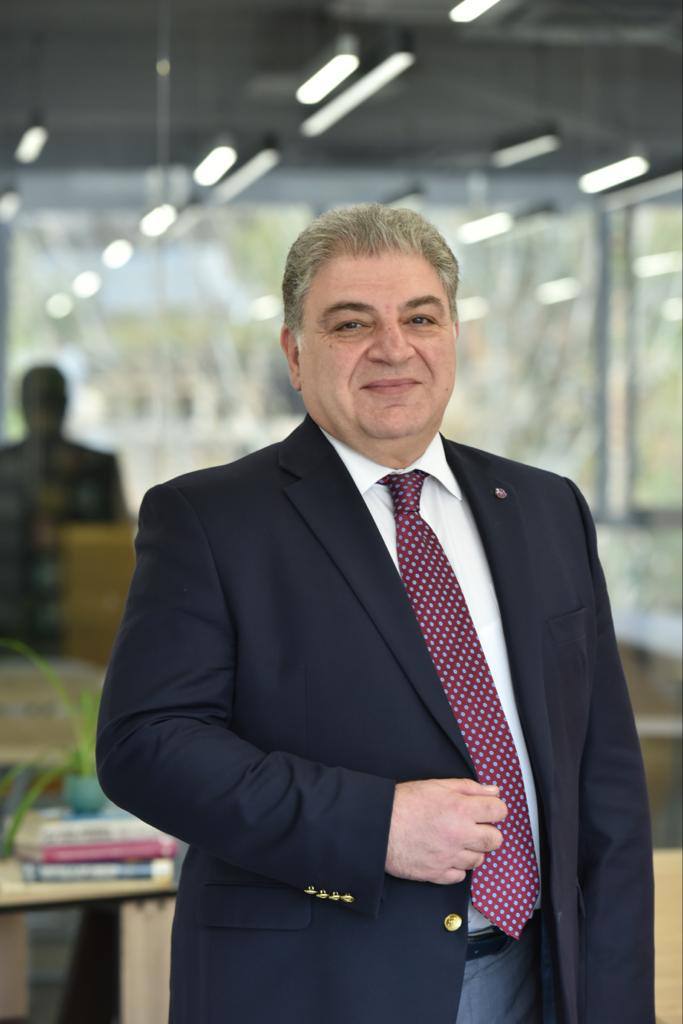
Groong Links:
Guest:
Topics:
- Background on Amb. Melikian
- From Revolution to War
- Goris-Kapan Handover
- Armenia’s “Pivot” To The West
- Srbazan Movement
- Pan-Armenian Diplomatic Council
Episode 352a | Recorded: August 12, 2024
Show Notes
Armenian Foreign Policy and The Srbazan Movement
Ambassador Melikian, as this is your first time on our show, please tell us about your background, interests, and research.
From “Revolution” To War
With so much history and experience behind you, Ambassador Melikian, we would like to hear about your experience in the Foreign Ministry during one of the most fateful times in recent Armenian history.
Specifically, on May 23, 2018, you were appointed as Secretary General at the Armenian Foreign ministry. That is two weeks after Pashinyan was elected as Prime Minister. You left your position at the MFA on July 19, 2021, shortly after the resignation of Ara Ayvazyan and 7 months after Pashinyan signed the disastrous Nov 9-10 statement.
Questions:
- Your experience at the MFA spans decades, however, can you tell us how it came to be that you moved from the Ministry of the Diaspora, where you were at that time, to the MFA? What were your feelings and hopes at the time?
- What were your thoughts and emotions during the 44 day war and when Nikol Pashinyan signed the Nov. 9-10 statement?
- And what made you stay in your position after Nov 10?
Goris-Kapan Handover
Now we’ll talk more about the demarcation and delimitation process, which is one big sham in my opinion. But I’d like to focus on one episode that happened immediately after the war. Despite the fact that the Nov 9-10 statement spelled out that forces stay where they are, Armenian forces simply pulled back tens of kilometers from Kovsakan (also known as Zangilan). Pashinyan later explained to the public that there were “verbal agreements”.
Why is this important? Because it eventually allowed the Azerbaijani armed forces to easily take over a segment of the Goris-Kapan strategic highway, when Pashinyan later argued that a few villages located on that route actually belong to Azerbaijan.
Recently, the Foreign Minister during the war, Ara Ayvazyan, revealed that there indeed was a separate secret document signed by the Defence Minister, Vagharshak Harutyunyan, which led to the giveaway of the strategic Goris-Kapan highway. In his interview to Azatutyun, Ayvazyan says that the Foreign Ministry was kept out of this agreement for six months, during his tenure.
Questions:
- You were at the MFA at the time. Can you confirm Ara Ayvazyan’s statements?
- What was the basis for signing that separate agreement, which seems to be completely separate from the Nov 9/10 statement, and why was it kept secret from the Armenian people?
Artsakh Conflict and The War
Let’s go a little deeper into the Artsakh conflict which culminated in the war. We want to understand what went wrong.
I believe it would be fair to say that there are two main narratives regarding the history of the negotiations and how we ended up where we did:
- First, some (like proponents of first president Levon Ter-Petrosyan) argue that Armenia should have taken the best deal it could have gotten, which was the 1997 “Step by Step” plan by the OSCE which Levon Ter-Petrosyan endorsed.
- They argue that Armenia had no chance of countering Azerbaijan’s oil revenue and rapid re-arming.
- The second narrative is that Armenia did the best it could and the Artsakh conflict was being more or less managed and only the policies of Pashinyan led to the outcome we had.
Questions:
- Can you give us your perspective on these two hypotheses, or narratives?
Defenders of Pashinyan say that by the time he took power, the negotiations were already in a failed state and that there was little he could do.
Questions:
- How would you address this argument from Pashinyan?
- Could the war have been prevented?
Turkey’s Role in 44 Day War
Given Erdogan’s recent boasting - that they will enter Israel just like they did Artsakh - let’s also talk about how important Turkey was to Azerbaijan’s victory.
There are many ways Turkey was involved:
- Both of our recent guests whom we asked (Arthur Martirosyan and Arman Grigoryan) were confident that Turkey was responsible for planning.
- There were reports that their special forces participated.
- There were reports that at least one part of the war was being managed and coordinated from an AWACS plane flying over Turkey.
- Turkey actually had several generals stationed in Azerbaijan.
- Last but not least - I don’t have facts to back this up - Turkey as a NATO member has access to NATO intelligence and imagery, hundreds of satellites. Can someone say that Turkey didn’t take advantage of this technology and pass over the intelligence to Azerbaijan, given that there are some reports that in the first 15 minutes of the war, many of our critical military targets (such as air defense systems) were obliterated?
Questions:
- In your assessment, how critical was Turkey’s role?
- At which point during the history of the conflict did Turkey cross the point at which their participation would be all but a certainty?
“Pivot” To The West
One of the main developments responsible for the tectonic shifts in the region was the growing conflict between Russia and the collective West. Today, with the disasters that happened in Georgia and Ukraine clear to all of us, the west is encouraging Pashinyan to reorient Armenia towards the West.
Questions:
- Does a Western orientation provide greater benefits than, for example, associating with the EAEU, Russia, etc? What is Pashinyan’s cost-benefit analysis that is leading him to reorient Armenia towards the West with such zeal?
According to Pashinyan, 90% of the content of the so-called “peace treaty” has been agreed upon. In the US a few weeks ago, State Dept officials said that the sides must be ready for “tough compromises” to bring the deal to a close.
Questions:
- We haven’t seen any compromise. Only one-sided concessions by Armenia. What are US officials thinking about when they continue to press for “tough compromises” from both sides?
- Does the US have any leverage to bring Azerbaijan to make compromises?
Srbazan Movement
Amb. Melikian, the Srbazan movement that started in Tavush and moved to Yerevan generated a lot of social movement. We saw some of the largest crowds on the streets since 2018.
Initially the Srbazan gave various “deadlines” to Pashinyan. First it was 1 hour, then a week. But if success is to be measured by the initial goal, to unseat Pashinyan, then we can say the movement was not successful so far.
After the June 12 crackdown by the Armenian government, the protest movement seems to have taken a step back to re-group. We know that currently most of the government is on vacation. The parliament has adjourned. We see the Srbazan actively working, meeting different groups of people in the regions and Yerevan itself.
Questions:
- What‘s the reason the Srbazan movement has not achieved success yet?
- What should we expect in September as the new “political season” opens?
- Is it possible that the movement will transform into a political party and participate in the 2026 elections?
Encouraged by Bagrat Srbazan, the “Pan-Armenian Diplomatic Council” was founded by you and other Armenian diplomats.
Questions:
- Can you tell us the purpose of this council? What are some accomplishments or output that we can see today?
On May 12, you announced a foreign policy plan that was endorsed by the Srbazan.
NOTE: Specific points of the policy are (Google Translate):
- RA’s foreign policy goal is uninterrupted and comprehensive negotiations on stable and lasting peace, with the agenda of all priority issues, with the aim of excluding the possibility of war. The new government of RA, as a new negotiator, should make a sober assessment and get rid of verbal agreements reached behind the people’s backs.
- Being committed to all international and documented obligations and commitments and guided by the security priorities of RA, we will engage in constructive and mutually beneficial negotiations.
- Implement a fundamental change in the foreign policy agenda, excluding anti-Russian, anti-Western, or any foreign policy content shaped by antis, adopting a flexible policy of containment.
- To exclude sharp foreign political turns and positions in the conditions of rapid changes and uncertainty in the world order.
- It is necessary to realize that international politics is a process where national interests are corrected, but never endangered.
- The concept of national interests is not subject to artificial peace, nor to the inevitability of war, on the contrary, it implies a permanent settlement of conflicting interests with all the diplomatic tools, the absence of which exists today and everyone knows.
- We must clarify our national interests, balance them in the conditions of new realities, without giving up our fundamental rights, without changing the sources of our identity, and without weakening the foundations of our statehood.
- We must restore our strategic relations with allies as quickly as possible, as well as deepen our partnership and cooperation with other power centers.
- Pan-Armenianism is a vital necessity to overcome the national crisis. Its new formulation, the only way to achieve it is to consider the consolidation of pan-Armenian potential, internal reconciliation and solidarity, in this case the irreplaceable leadership and active role of the Armenian Apostolic Holy Church, pan-Armenian structures and the legal authorities of the Republic of Artsakh is undeniable.
- The Armenian people have a unique opportunity to achieve internal reconciliation, cohesion and unity, which will significantly contribute to the effective implementation of foreign policy
Questions:
- What are the main differences with Pashinyan’s policy?
- One of the key points you mention is to adopt a flexible policy that is not based on being anti-Russian or anti-US, essentially the policy of complementarity of previous governments. Is it possible to achieve complementarity in today’s geopolitical environment?
Guests

Vahagn Melikian
Mr. Vahagn Melikian is a seasoned Armenian diplomat with a career spanning over three decades. Melikian has held numerous key positions in the Ministry of Foreign Affairs. His notable roles include serving as Secretary General of the Ministry from 2018 to 2021 and Deputy Minister of the Ministry of Diaspora from 2015 to 2018. Melikyan’s ambassadorial appointments have been extensive, representing Armenia in countries such as Argentina, Chile, Uruguay, Paraguay, Qatar, Bahrain, Kuwait, and the United Arab Emirates.
Melikian’s contributions to diplomacy have been recognized through several prestigious awards, including the Commemorative Medal of the Ministry of Foreign Affairs, the Gilded Coin of the Ministry of Foreign Affairs, the Grand Cross of the Order of May from Argentina, the Mkhitar Gosh Medal, and the second-class Medal of Services to the Motherland. Fluent in English, Russian, French, and Arabic, he has significantly advanced Armenia’s diplomatic relations and international presence.
Vahagn Melikian is a founding member of the Pan-Armenian Diplomatic Council. Melikian is married and has two children.
Hosts

Asbed Bedrossian
Asbed Bedrossian is an IT professional, and for years oversaw the central IT enterprise infrastructure and services at USC. His decades of experience spanned across IT strategy, enterprise architecture, infrastructure, cybersecurity, enterprise applications, data center operations, high performance computing, ITSM, ITPM, and more.
Asbed founded the Armenian News Network Groong circa 1989/1990, and co-founded the ANN/Groong podcast in 2020.

Hovik Manucharyan
Hovik Manucharyan is an information security engineer who moved from Seattle to Armenia in 2022. He co-founded the ANN/Groong podcast in 2020 and has been a contributor to Groong News since the late 1990s.
Disclaimer: The views expressed by Hovik Manucharyan on the ANN/Groong podcast are his own and do not necessarily reflect the opinions of his employer or any other organization.